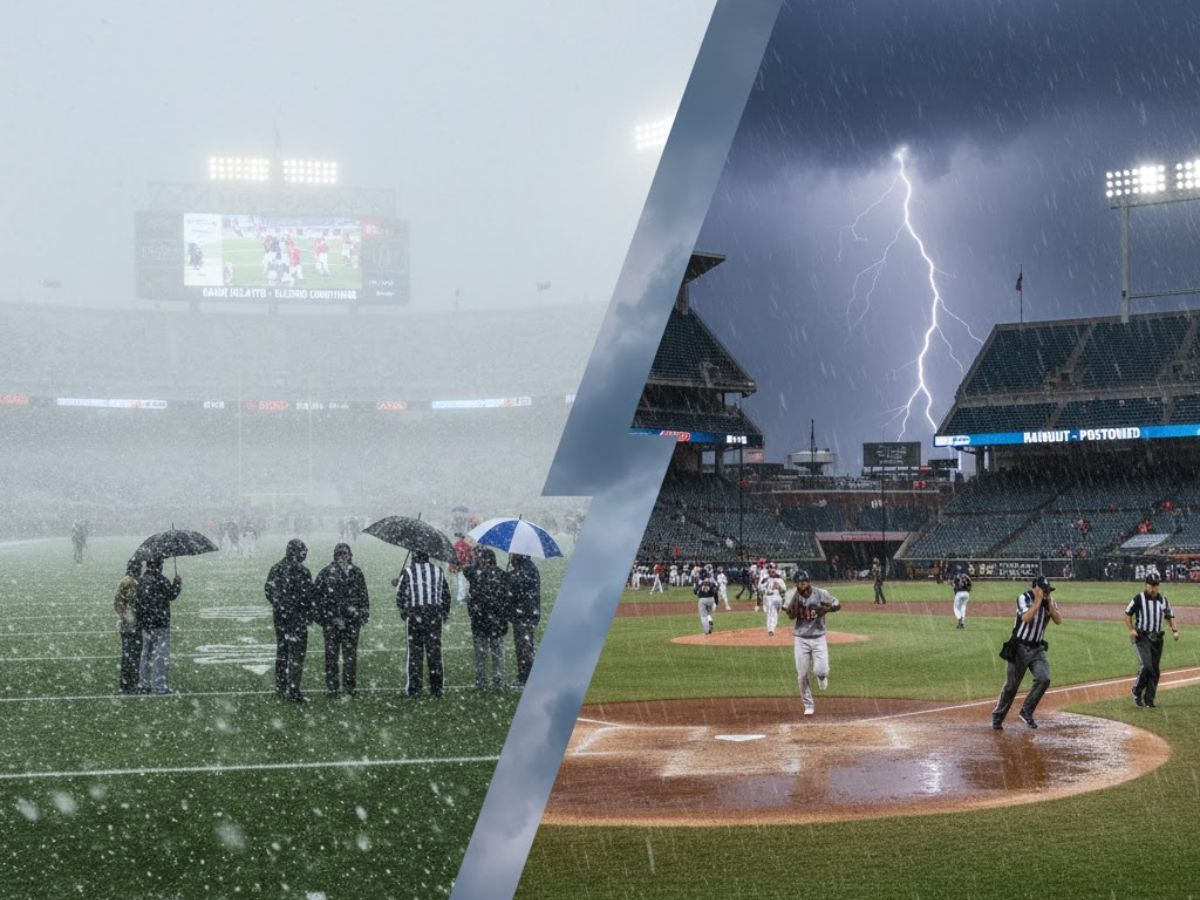When you open your sportsbook app, odds might look purely mathematical, shaped by team stats, player form, and public betting trends. But there’s another invisible force that can swing both outcomes and odds: the weather. Wind, rain, heat, or even a sudden temperature drop can change the entire flow of a game, from how far a football travels to whether a baseball clears the outfield wall. Sportsbooks know this. In fact, weather forecasts are one of the quietest but most influential factors that oddsmakers adjust for, especially in outdoor sports.
If you’ve ever wondered why point totals drop before kickoff or why a favorite’s odds tighten on a rainy Sunday, this guide will break down how and why weather impacts sports betting odds, and how smart bettors use that to their advantage.
How weather influences sports betting odds
Weather doesn’t change every line, but when it does, it often affects the total points, passing efficiency, or team performance. Oddsmakers track weather patterns leading up to the game, and as forecasts change, so do the odds.
Here’s a closer look at how specific weather conditions influence different sports.
1. Wind: The silent line-mover
Wind is arguably the most powerful weather factor that moves betting odds, particularly in football and baseball.
In football, strong winds (15 mph or more) can reduce passing accuracy, lower field goal success rates, and limit deep plays. When sportsbooks anticipate windy conditions, the total (Over/Under) often drops by several points.
Example:
If a college football game opens with a total of 57.5 and forecasts call for 20 mph winds, you might see it dip to 53.5 or lower before kickoff.
In baseball, wind direction can dramatically alter scoring. A 10 mph wind blowing out at Wrigley Field can turn routine fly balls into home runs,pushing totals higher. The same speed blowing in? Bettors pound the Under.
2. Rain: Turning games into ground battles
Rain affects nearly every outdoor sport, but football and baseball feel it the most.
In football, heavy rain usually benefits teams with strong running games and physical defenses. Passing-heavy teams struggle in slippery conditions, leading sportsbooks to lower totals and shift spreads slightly toward the underdog.
In baseball, wet fields can slow down grounders and affect pitchers’ grips. You’ll often see totals fall if rain is expected, but lines might get temporarily taken down if the forecast suggests a possible delay or cancellation.
Pro tip: Track the radar, not just the forecast, oddsmakers adjust in real-time when conditions shift before kickoff or first pitch.
3. Snow and extreme cold: The great equalizer
When snow hits — especially in NFL or college football games — everything changes. Passing becomes difficult, kicking becomes unreliable, and teams rely heavily on the run game.
Oddsmakers often drop totals sharply before snowy games. Bettors who spot this early can sometimes grab value on the Under before the books adjust.
But don’t assume all snow equals low scoring. Some snow games, like the famous 2013 Eagles-Lions blizzard, produced surprising shootouts as defenders slipped and missed tackles. That unpredictability is why experienced bettors look beyond headlines — and check actual on-field conditions.
4. Heat and humidity: Hidden stamina killers
High temperatures might not grab attention like snow or wind, but they quietly impact games — especially early-season football, baseball, and tennis.
In football, excessive heat wears down defenses faster, which can lead to late scoring bursts. In baseball, hot air makes the ball travel farther, often nudging totals slightly higher.
Sportsbooks track this too. Some totals rise by half a point or more in extreme heat. Savvy bettors who study weather databases for venues like Miami or Phoenix can spot opportunities that casual fans overlook.
5. Indoor vs outdoor factor
For indoor sports (like NBA or NHL), weather has minimal direct impact, but can still influence travel schedules or fan attendance, indirectly affecting momentum or performance.
Outdoor sports like NFL, MLB, and college football are where weather plays a direct, measurable role. Bettors who account for stadium type (open-air vs retractable roof) can fine-tune their strategy even further.
How US sportsbooks adjust odds for weather
Most major US sportsbooks — DraftKings, FanDuel, BetMGM — integrate real-time weather data into their oddsmaking systems. When forecasts predict wind, rain, or snow, they typically:
- Lower totals (expecting fewer points or runs).
- Shift spreads slightly toward teams built for physical play.
- Delay or suspend markets if conditions may cause a postponement.
This happens fast, often hours before casual bettors notice the change. That’s why timing your bet is key.
If you bet early and weather worsens, you might get a favorable number. But if you wait until after the public reacts, the line value could be gone.
Quick weather-betting strategies
- Use local forecasts: Follow meteorologists near stadiums, not national weather apps. Local reports catch stadium-specific shifts faster.
- Monitor line movement: A sudden half-point drop in totals without major injury news often hints at weather influence.
- Track historical trends: Some stadiums (like Soldier Field or Arrowhead) have strong weather-based performance patterns.
- Don’t overreact: Light rain or mild wind rarely changes outcomes, focus on sustained, measurable impact (like 20+ mph wind).
- Consider player style: Quarterbacks with strong arms or run-heavy offenses handle bad weather better than finesse teams.
Weather won’t determine every bet, but ignoring it means missing a major piece of the puzzle. In outdoor sports, even small shifts, a gust of wind, a drizzle, or a heatwave, can swing the outcome and reshape the odds.
For US bettors who want to stay ahead of the line, learning to read weather patterns is as valuable as studying team stats. Because sometimes, the smartest play isn’t on the field, it’s in the forecast.
FAQs
Q1. Which sport is most affected by weather?
Football and baseball are the most weather-sensitive. Wind, rain, and temperature all impact how these games are played — and how lines move.
Q2. Can sportsbooks get the weather wrong?
Yes. Sudden weather changes can catch sportsbooks off guard, leading to short windows where sharp bettors grab value before odds update.
Q3. How can I track weather for betting?
Sites like Weather.com, Windy, and stadium-specific radar maps are best. Some betting tools even integrate real-time weather overlays for bettors.
Q4. Should I always bet the Under in bad weather?
Not necessarily. While many weather conditions reduce scoring, each matchup is unique — team style, surface type, and player adaptability all matter.
Q5. Do sportsbooks overreact to weather forecasts?
Sometimes. Public perception of “bad weather = low scoring” can push totals too far down, creating value on the Over for sharp bettors.








